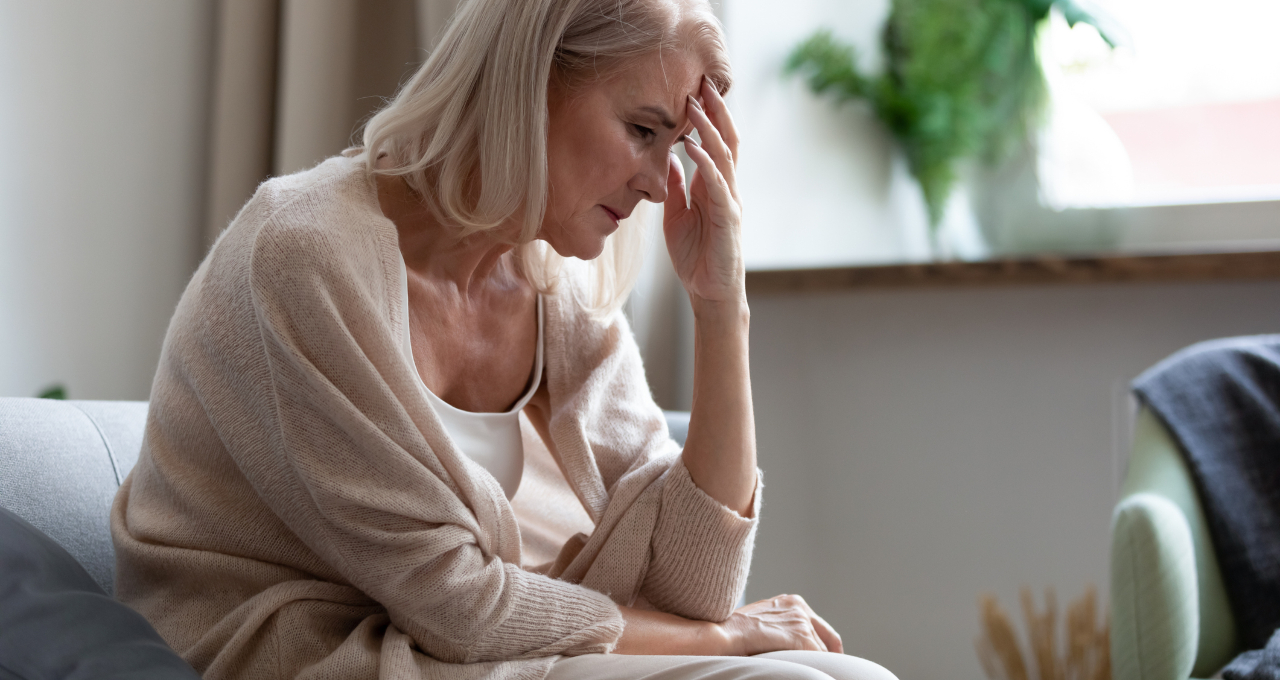Turning 40 might bring more than just a big birthday celebration—it could also start showing signs of early menopause. Are you noticing changes like irregular periods or unexpected mood swings? It’s not just you; many women see these shifts. But what exactly does this mean, and how should you handle it? Let’s find out the signs of menopause at 40 and what they could mean for your health.

Contents
- 1 What Are The Signs Of Menopause At 40?
- 1.1 1. Irregular Periods
- 1.2 2. Hot Flashes and Night Sweats
- 1.3 3. Mood Swings and Emotional Changes
- 1.4 4. Vaginal Dryness
- 1.5 5. Sleep Disturbances
- 1.6 6. Decreased Libido
- 1.7 7. Weight Gain and Slower Metabolism
- 1.8 8. Thinning Hair and Dry Skin
- 1.9 9. Memory and Concentration Issues
- 1.10 10. Urinary Issues
- 2 What Is The Earliest Age For Menopause?
- 3 Treatment For Early Menopause
- 4 Frequently Asked Questions
What Are The Signs Of Menopause At 40?
Experiencing menopause at 40 is considered early menopause, and it can manifest through various signs and symptoms. Here are some common indicators:
1. Irregular Periods
At 40, one of the first signs of menopause is often a change in menstrual patterns. You might notice that your periods are becoming irregular—skipping months, varying in flow, or even occurring more frequently before ceasing altogether. These changes are typically due to declining estrogen levels, which disrupt the regular menstrual cycle.
2. Hot Flashes and Night Sweats
Hot flashes are sudden, intense feelings of heat that aren’t caused by external sources and are often accompanied by sweating, reddening of the skin, and rapid heartbeat. They can occur at any time of the day or night. Night sweats specifically occur during sleep and can significantly disrupt your comfort and sleep quality.
3. Mood Swings and Emotional Changes
During the early stages of menopause, many women experience mood swings and emotional changes. This can manifest as irritability, anxiety, sadness, or sudden shifts in mood. These emotional responses are linked to the hormonal upheavals that accompany menopause, affecting neurotransmitter levels involved in mood regulation.
4. Vaginal Dryness
Decreased estrogen levels during menopause can lead to vaginal dryness, which might result in discomfort during intercourse and increased vaginal irritation or itching. This condition not only affects physical health but can also impact intimate relationships and personal comfort.
5. Sleep Disturbances
Many women in their 40s experiencing menopause report difficulties with sleep, which may include trouble falling asleep, staying asleep, or experiencing disrupted sleep due to night sweats. Good sleep hygiene, including a cool, comfortable sleeping environment and regular sleep schedules, may help mitigate some of these issues.

6. Decreased Libido
Menopause can lead to a decrease in sexual drive or libido. This is largely due to hormonal changes, particularly the decrease in estrogen, which affects sexual arousal. For many women, this is a direct impact of both physical symptoms like vaginal dryness and emotional changes like mood swings.
7. Weight Gain and Slower Metabolism
Metabolic rates drop during menopause, often resulting in weight gain, especially around the abdomen. This change is attributed to aging as well as hormonal shifts. Engaging in regular physical activity and mindful eating can help manage weight during this transition.
8. Thinning Hair and Dry Skin
Reduced estrogen levels can lead to thinner, less hydrated skin and hair loss. These changes may affect self-esteem and body image. Using moisturizing products and taking care of your skin and hair with appropriate products can alleviate some of these symptoms.
9. Memory and Concentration Issues
Cognitive changes such as difficulties with memory or concentration, often referred to as “brain fog,” are common complaints among women undergoing menopause. These symptoms can be frustrating but are typically temporary.
10. Urinary Issues
Menopausal changes can also affect the urinary tract, leading to symptoms like increased urgency or frequency of urination, or a higher susceptibility to urinary tract infections. Pelvic floor exercises and staying hydrated can help manage these symptoms effectively.
What Is The Earliest Age For Menopause?
Treatment For Early Menopause
Treatment for early menopause, also known as premature menopause or primary ovarian insufficiency (POI), focuses on managing symptoms and addressing potential health consequences related to reduced hormone levels. Here are common approaches:

-
Hormone Replacement Therapy (HRT): This is the most common treatment for managing the symptoms of menopause, including for those experiencing it prematurely. HRT involves taking medications containing the hormones that the body no longer produces naturally, mainly estrogen and sometimes progesterone. This can help alleviate hot flashes, prevent bone loss, and reduce other menopausal symptoms.
-
Calcium and Vitamin D Supplements: To combat the increased risk of osteoporosis associated with early menopause, doctors often recommend increased intake of calcium and vitamin D, either through diet or supplements.
-
Regular Health Screenings: Women who experience early menopause are at a higher risk for certain conditions like heart disease and osteoporosis. Regular check-ups, bone density tests, and cardiovascular health monitoring are important.
-
Lifestyle Changes: Incorporating regular physical activity, maintaining a healthy diet, quitting smoking, and reducing alcohol consumption can help manage symptoms and reduce the risk of developing more serious health issues.
-
Psychological Support: Early menopause can have significant emotional effects, possibly leading to anxiety or depression. Counseling or support groups may be beneficial in managing these aspects.
-
Alternative Therapies: Some women find relief through alternative treatments like acupuncture, herbal supplements, or yoga, although it’s important to discuss these with a healthcare provider before starting.
Frequently Asked Questions
What can a woman expect at age 40?
At age 40, women can often experience changes in mood and sleep patterns. They may feel more irritable, fatigued, and have irregular periods. However, although some symptoms may align, menopause is generally not expected at this age.
How is early menopause treated?
Early menopause can be managed through medication often involving hormone replacement therapy (HRT) or the combined contraceptive pill. These treatments help in replacing the hormones that the body starts to lack.
Is it possible to start menopause at 40?
Early menopause, typically occurring between 40 and 45 years of age, can affect up to 12% of women. This percentage may increase when considering menopause induced by surgery or cancer treatments.
What’s the average age for perimenopause to start?
Perimenopause typically begins in the late 30s to early 40s. This stage is marked by significant changes in menstrual flow and the length of the menstrual cycle.
Who is the oldest woman to have a period?
The oldest recorded age for a woman to have a period is 57 years. This is, however, an exception rather than the norm; most women experience menopause earlier.
I am a medical student with experience and interest in Women’s health and well-being.